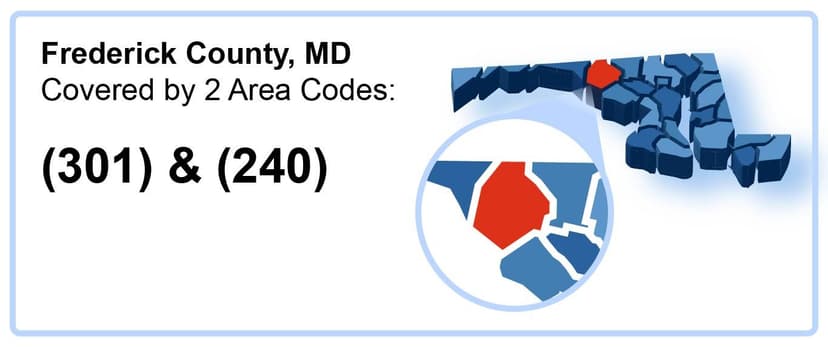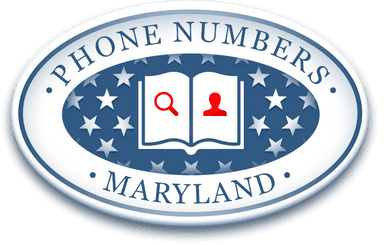What are Frederick County Area Codes?

Area codes were introduced by the North American Numbering Plan Administrator (NANPA) to simplify the process of making phone calls. Area codes are the first three digits of phone numbers in territories covered by the NANPA. An area code identifies a specific Numbering Plan Area (NPA) which indicates the origin of a phone call. The NANPA provides area code lookup on its website.
Two area codes serve Frederick County. These are:
Area code 301
Area code 301 is a Maryland telephone area code that was put into service in 1947. Cities in Frederick County within the area code 301 are Frederick, Burkittsville, Brunswick, Emmitsburg, Mount Airy, Myersville, New Market, Thurmont, Walkersville, Woodsboro, and Middletown.
Area code 240
Area code 240 is an overlay to the 301 NPA. Introduced in 1997, area code 240 serves all the locations within the 301 NPA.
What are the Best Cell Phone Plans in Frederick County?
In Frederick County, the major phone carriers provide excellent network services and coverage. In Frederick City, Verizon has the best network spread at 100%, followed by AT&T with 88% coverage. T-Mobile and Sprint cover 78% and 76% of the city, respectively. County residents also enjoy network services provided by several smaller Mobile Virtual Network Operators (MVNOs).
A 2018 National Center of Health Statistics survey conducted for Maryland residents showed a significant substitution of landlines by cell phones. It estimated that 39.4% of Maryland adults exclusively relied solely on wireless telephony services. In contrast, only 3% of them still used landline phones exclusively. Among children below 18 years, 49.1% depended on cell phones solely, while an insignificant 0.8% used landline phones only.
Due to its large population and the growing number of businesses, Frederick County currently has several companies offering Voice over Internet Protocol (VoIP) telephony services for residents. VoIP is a technology that allows users to make phone calls over broadband internet connections. With VoIP, Frederick County residents have a variety of products and competitive prices from which they can choose.
What are Frederick County Phone Scams?
Frederick County phone scams are fraudulent phone calls made by scammers to county residents. Phone scammers target their victims to steal money and personal information from them. The Frederick County Sheriff’s Office urges county residents to be wary of the fraudulent activities perpetrated by phone circulating throughout the county. Phone number search applications can return information on scammers and help residents avoid scams. Public institutions that provide protection for Frederick County residents against phone scams include:
- Maryland Attorney General Office (Consumer Protection Division).
- Frederick County Sheriff’s Office.
- Federal Trade Commission (FTC).
Common phone scams being perpetrated in Frederick County include:
What are Jury Duty Scams?
In this scam, fraudsters impersonate Frederick County courts or law enforcement officials and call residents to inform them that they have missed jury duty. Jury duty is a crucial civic obligation that is not expected to be taken lightly by any citizen. Scammers often take advantage of the limited information residents have about the jury duty process to extort them. They threaten to have their targets arrested immediately if they fail to pay court fines for failing to appear in court. Alternatively, the con artists may ask for confidential information like their marks’ social security numbers for supposed verification of court records. Unfortunately, persons who yield to this scam scheme end up losing their money, and sometimes, identities. Although it is inappropriate to miss jury duty, the Frederick County District Court will never call to threaten residents who do not appear for them. Also, they will never request residents’ social security numbers or financial information over the phone. If you receive this type of call, use free reverse phone lookup services to identify who called. Any county resident in doubt of the authenticity of such calls should hang up immediately. They can contact the Frederick County District Court on their official phone numbers to verify the callers’ claims.
What are COVID-19 Scams?
Strict measures placed by the government to best manage the coronavirus pandemic have negative impacts on many Frederick County small businesses. Most employers now work with reduced staff strength due to job loss by employees. However, scammers are taking advantage of the high unemployment rate to steal money and confidential financial information from unsuspecting targets. They contact county residents claiming to be government officials in charge of disbursing COVID-19 stimulus checks and promise them to speed up theirs at a fee. Alternatively, the swindlers may guarantee their targets early access to the government-approved COVID-19 testing, treatment, or vaccine. They will request their targets’ social security numbers and personal information while promising to register them. Such information, if given, can be used for identity theft. COVID-19 scammers typically ask to be paid through odd payment channels. The FTC warns residents never to respond to the demands of these callers but hang up their phones if they get such calls.
What are Government Grant Scams?
Fraudsters pretend to be government officials and call naive Frederick County residents to inform them that they qualify for government grants. They will ask for their targets’ bank account information and some confidential data with a promise to deposit the money into the bank accounts provided. In some cases, these scammers will ask their targets to send money to cover processing fees. In reality, government grants are not awarded to individuals but to universities, organizations, local and state agencies. Government grants are typically for projects and researches that are beneficial to the public. Victims of this scam never get to receive the alleged grants and eventually lose the money they send to scammers. County residents should never give out their confidential information to unknown persons. They should also be aware that they cannot benefit from government grants when they do not apply for them. Good reverse phone lookup services can reveal the identities of scam callers and help ascertain if phone calls are spoofed or not.
What are Investment Scams?
These are scams in which unsuspecting residents are promised high returns on investments with overly minimal risk. The scammers often persuade their targets to pay some money to gain access to seminars and resources on their ‘’proven’’ money-making systems. In some cases, these fraudsters will ask their targets to send money so that they can invest it on their behalf. Victims of investment scams never get the profits they were promised and eventually lose their capital as well. The scammers sometimes obtain personal and bank account information from their victims and then commit identity and financial theft. Frederick County residents should properly research investment opportunities before putting in their money. Residents who fall victim to investment scams in Frederick County can report them to the Securities and Exchange Commission (SEC). They can also use reverse number lookup tools to retrieve identifying information about the scammers.
What are Lottery Scams?
In lottery scams, fraudsters try to steal money and confidential information using phony lotteries and prizes. They call to inform their marks that they are lucky winners of lotteries and insist that mandatory shipping fees or taxes be paid to claim their winnings. In most instances, there is nothing to be won. In cases where prizes are given, they turn out to be worthless or of far less than the expected value. Residents are advised never to pay any fee to receive lottery rewards or give out confidential information to unknown callers. Residents should also know that lottery rewards can only be won when one enters a legitimate lottery contest. Reverse phone number lookup applications can uncover the identities of these callers.
What are Robocalls and Spam Calls?
Robocalls are automated telephone calls that are programmed to deliver pre-recorded messages and are legitimately used by telemarketers and political organizations. Scammers have, however, adopted robocalls in perpetrating their dubious schemes. They send out bulk unsolicited spam calls with the hope of phishing sensitive information or data from their victims. The information they glean from their victims can be used to commit financial and identity theft. Phone scammers spoof robocalls to make targeted individuals believe that they are from legitimate organizations. However, good reverse phone lookup services can help county residents ascertain if incoming calls are spoofed or not.
If you receive a robocall, the appropriate responses are:
- Hang up immediately. Avoid following any prompt by the robocall because this can lead to even more robocalls.
- Enroll your phone number in the National Do Not Call Registry to reduce the frequency of unsolicited robocalls.
- Report robocall numbers online to the Federal Trade Commission or via phone call at (888) 382-1222.
- Conduct a phone number search free of charge or a suspicious phone number lookup using online services to answer the question “who called me?”.
- Block identified robocall numbers from future calls. The FTC provides consumers with information on blocking unwanted calls.
How Can You Spot and Report Frederick County Phone Scams?
To spot a phone scam in Frederick County, you must be vigilant as scammers continually adopt newer means to defraud unsuspecting residents. Frederick County Sheriff’s Office warns residents to beware of phone scams, specifically calls from spoofed phone numbers. The signs that a call is a scam call include the following:
- The caller instructs you to pay by specific payment methods. Scammers’ preferred channels of payment are wire transfers, cryptocurrencies, cash, and gift cards, which are difficult to trace.
- The caller offers a limited-time opportunity so that you can make a hasty purchase decision.
- The caller becomes aggressive in an attempt to get you to divulge confidential information or coerce payment. They may threaten you with arrest, license suspension, or jail. Typically, unless a customer initiates a process that will lead to the sharing of sensitive information, legitimate organizations will not request such.
Phone number lookup applications can help identify scammers and protect residents from falling victim to phone scams. Consumer protection agencies are at the forefront of the fight against the phone scams menace in Frederick County. They provide educational information and easy means of reporting phone scams. These agencies include:
- Frederick County Sheriff’s Office - Frederick County residents who have been victims of phone scams can report them to the Frederick County Sheriff's Office online or by calling (301) 600-2071.
- Maryland Attorney General Office - Frederick County Residents can file phone scam complaints with the Consumer Protection Division (CPU) of the Attorney General’s Office online or by mail.
- Federal Trade Commission (FTC) - Frederick County residents can file online reports of phone scam incidents with the FTC. They can also enroll their phone numbers on the National Do Not Call Registry to reduce the frequency of unsolicited robocalls and avoid robocall scams. Residents are encouraged to report any unwanted robocalls they get after their phone numbers have been on the National Registry for over 31 days.
- Federal Communications Commission (FCC) - Frederick County residents can file online complaints of phone scam cases with the FCC.
